 Unexploded Remnants by Elaine Gallagher
Unexploded Remnants by Elaine Gallagher Format: eARC
Source: supplied by publisher via Edelweiss
Formats available: paperback, ebook
Genres: artificial intelligence, science fiction
Pages: 111
Published by Tordotcom on June 25, 2024
Purchasing Info: Author's Website, Publisher's Website, Amazon, Barnes & Noble, Kobo, Bookshop.org, Better World Books
Goodreads
An A.I. wages war on a future it doesn't understand.
Alice is the last human. Street-smart and bad-ass.
After discovering what appears to be an A.I. personality in an antique data core, Alice undertakes to find its home somewhere in the stargate network, or lay him to rest. Her find is the control unit of a powerful ancient weapon system.
But releasing the ghost of a raging warrior for whom the war is still under way is as much of a mistake as the stories tell, and Alice finds herself faced with an impossible choice against an unstoppable foe.
My Review:
Alice is the last human in the galaxy. As far as she’s concerned, she’s definitely in Wonderland – even when it seems like the whole, entire ‘verse is out to get her.
There are two stories packed into Unexploded Remnants, and that’s a lot of packing for a novella. First, there’s Alice’s whole backstory – which must be huge and fascinating but we only get glimpses which are not NEARLY enough.
She’s literally the last of her kind and the reason she got to be that and what happened after and how she’s coped with her singularity in the big wide galaxy at large has to have been a huge story of awakening and culture shock – and I wish that was the story we had. Or I wish we’d get it someday.
Or both. Definitely both.
Instead, we get hints and dribbles, because the story we actually have is an entirely different big story. Alice is kind of an intergalactic treasure hunter. An archeologist of lost civilizations and an explorer of lost cultures – much like her own.
That she freelances for ‘The Archive’ in this vocation/avocation reminded this reader quite a lot of Genevieve Cogman’s Invisible Library series. So if you loved that you might have a hook to this.
So Alice is a bit of a bazaar and flea market aficionado who has more than enough knowledge to get more than occasionally lucky. Or unlucky, as the case might be. And certainly is here.
She barters for a trinket that looks a lot like a 20th century Earth lava lamp – although it’s certainly not that. It might have a system inside its dirty and unprepossessing carapace that she might be able to tease out and communicate with. It should be worth something – if only to the Archive.
It turns out to be a whole lot more than Alice bargained for – both literally and figuratively. As soon as she closes the deal, it seems like a whole, entire platoon of dishonorable warmongers close in on her position in an attempt to steal whatever it is out of her grasp. A platoon that doesn’t seem to care in the least about collateral damage to the marketplace, the crowd of shoppers, or Alice herself.
So she runs. And as she runs from planet to planet through a vast network of transportation gates, she has the opportunity to make friends with the system inside the ‘lava lamp’, an entity she names ‘Gunn’. The question is whether Gunn is a soldier or just a weapon. Her pursuers believe he’s merely a weapon. Alice is convinced that he’s more.
But whichever he is, the war he was made for or recruited into is over – and has been for 10,000 years. His people – and their bitter enemy – committed mutual genocide. And her pursuers seem all too eager to employ Gunn’s expertise in their own bitter conflict without thought or care about how his ended.
Escape Rating B: The reason that I picked this up – and its biggest drawback – are the same. It’s short. Unexploded Remnants is a novella. In fact, it’s the author’s debut novella. It’s supposed to be short. But the story it contains is too big for the length of the format. Or there should have been two of them. One for Alice’s backstory – which sounds absolutely fascinating if more than a bit heartbreaking. And then a second novella for this ‘adventure’ which gives readers a tantalizing glimpse of the universe that saved her and made her whole, while telling a story about the price of peace and the cost of war.
As I was reading, the SFnal elements struck a lot of familiar chords. I mentioned the Invisible Library series earlier, because that is certainly part of this story. Irene’s job in the Invisible Library series, is to acquire cultural artifacts and knowledge for the Library, while the Library’s purpose for those artifacts is to use the knowledge gained to preserve the balance between order and chaos for all the worlds it touches.
Howsomever, not only is Alice’s job very similar to Irene’s, but Alice’s Archive does the same job as Irene’s Library, using the knowledge it has gained from the artifacts and databases it has collected to preserve the balance between order and chaos, specifically by keeping the galaxy on the knife edge between outright war and an occasionally aggressive peace.
While the vastness of the galaxy – along with its system of interstellar gate travel – recalled Stargate, Babylon 5 and especially Mass Effect, there was a feel to this story that gave me a lot of the same vibes as This Is How You Lose the Time War, except that in this instance that war has already been lost and Gunn is the only survivor. I also had rather mixed feelings about Time War, so the analogy works on that level as well, although a LOT more people adored Time War than seem to have Unexploded Remnants – at least so far – so your reading mileage may vary.
Personally, I found Alice’s rapid exploration of her adopted universe fascinating if a bit of a tease. I enjoyed her sprinkling of 20th and 21st century pop culture references – which seemed to serve her as both a reminder of where she came from and a personal code that defied automated translators without seeming deliberately clandestine.
Howsomever, as much as I liked the way the story ended, that ‘Gunn’ was treated as an old soldier instead of as merely a weapon – and as much as I agreed with the overt political message – that message was very overt to the point where it breaks the fourth wall even though I believe the theories posited are more plausible than anyone likes to think about.
In the end, some mixed feelings. I loved the universe, I liked Alice, the chases were riveting, but the message was a bit heavy-handed and the whole thing should have been longer or this should have been a duology.
But this is a DEBUT novella, and it packed in a lot of good stuff – if just a bit stuffed. I’m looking forward to seeing what the author comes up with next.

 A Ruse of Shadows (Lady Sherlock, #8) by
A Ruse of Shadows (Lady Sherlock, #8) by 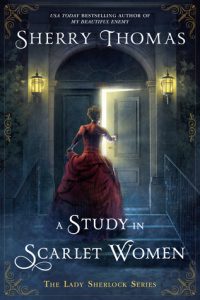 (This is a hint, by the way. Theoretically the books in this series could be read as standalone, but I wouldn’t recommend it. It’s not just that the endings of each book flow into the next, but that there’s a vast, interconnected and rather sticky web between all of the cases – at least so far. I’m glad I began at the beginning with A
(This is a hint, by the way. Theoretically the books in this series could be read as standalone, but I wouldn’t recommend it. It’s not just that the endings of each book flow into the next, but that there’s a vast, interconnected and rather sticky web between all of the cases – at least so far. I’m glad I began at the beginning with A Escape Rating B+: I have consistently found this series to be fascinating and frustrating in equal measure – and this entry in the series is no exception.
Escape Rating B+: I have consistently found this series to be fascinating and frustrating in equal measure – and this entry in the series is no exception. This story is also a bit of a mirror image to
This story is also a bit of a mirror image to  The Comfort of Ghosts (Maisie Dobbs, #18) by
The Comfort of Ghosts (Maisie Dobbs, #18) by 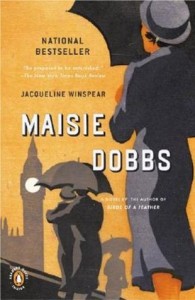 As seems fitting for this final book in the Maisie Dobbs series, A Comfort of Ghosts begins with an ending. One of the towering – literally as he was quite tall – secondary figures in this long-running series, Lord Julian Compton, originally Maisie’s employer, once-upon-a-time her father-in-law, later and last her friend, has died, Leaving Maisie to mourn, to comfort his widow, to be the executor of his estate and to clean up his last act in the late war.
As seems fitting for this final book in the Maisie Dobbs series, A Comfort of Ghosts begins with an ending. One of the towering – literally as he was quite tall – secondary figures in this long-running series, Lord Julian Compton, originally Maisie’s employer, once-upon-a-time her father-in-law, later and last her friend, has died, Leaving Maisie to mourn, to comfort his widow, to be the executor of his estate and to clean up his last act in the late war.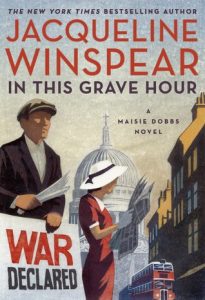 Escape Rating A-: This story closes all the circles that were opened back in the very first book in this series, the titular
Escape Rating A-: This story closes all the circles that were opened back in the very first book in this series, the titular  For those, like this reader, who have gotten to know Maisie over the years and books, this story is a bittersweet delight. It also feels right that Maisie leave the stage at this historical juncture, as the world she knew is not the world that is to come – as we know and as hints are shown in the story.
For those, like this reader, who have gotten to know Maisie over the years and books, this story is a bittersweet delight. It also feels right that Maisie leave the stage at this historical juncture, as the world she knew is not the world that is to come – as we know and as hints are shown in the story. The Runes of Engagement by
The Runes of Engagement by  Service Model by
Service Model by 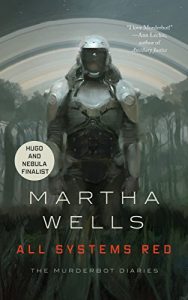 Escape Rating A+: I went into this completely unsure of what to expect, and that blurb of
Escape Rating A+: I went into this completely unsure of what to expect, and that blurb of  Fiasco (Uncharted Hearts, #2) by
Fiasco (Uncharted Hearts, #2) by 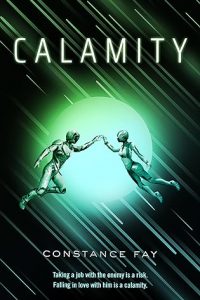 Escape Rating A+: They still have me at Serenity. Seriously, the resemblance to
Escape Rating A+: They still have me at Serenity. Seriously, the resemblance to  The Fireborne Blade (The Fireborne Blade, #1) by
The Fireborne Blade (The Fireborne Blade, #1) by  Escape Rating A-: Initially, this seemed like a rather traditional knight vs. dragon story, with one of two inevitable endings. Either the knight dies or the dragon does. Or occasionally both in a blaze of mutual glory. So there’s three inevitable endings.
Escape Rating A-: Initially, this seemed like a rather traditional knight vs. dragon story, with one of two inevitable endings. Either the knight dies or the dragon does. Or occasionally both in a blaze of mutual glory. So there’s three inevitable endings. And in the process of telling its story about the knight and the dragon, it asks some surprising questions about change vs stability and striking that balance, and makes that discussion personal in ways that change every single thing we thought we knew going in.
And in the process of telling its story about the knight and the dragon, it asks some surprising questions about change vs stability and striking that balance, and makes that discussion personal in ways that change every single thing we thought we knew going in. To Gaze Upon Wicked Gods (Gods Beyond the Skies, #1) by
To Gaze Upon Wicked Gods (Gods Beyond the Skies, #1) by  Lost Ark Dreaming by
Lost Ark Dreaming by  The Marlow Murder Club (Marlow Murder Club, #1) by
The Marlow Murder Club (Marlow Murder Club, #1) by 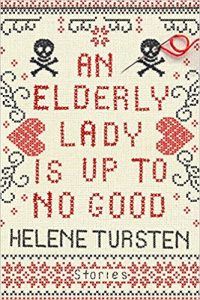 Recommended, pretty much everywhere as a readalike for
Recommended, pretty much everywhere as a readalike for  The other thing I really liked was that, while the local police were completely overwhelmed by a serial killer in their tiny town, the reasons they were overwhelmed were much easier to understand and empathize with than the lackluster performance of the local constabulary in
The other thing I really liked was that, while the local police were completely overwhelmed by a serial killer in their tiny town, the reasons they were overwhelmed were much easier to understand and empathize with than the lackluster performance of the local constabulary in